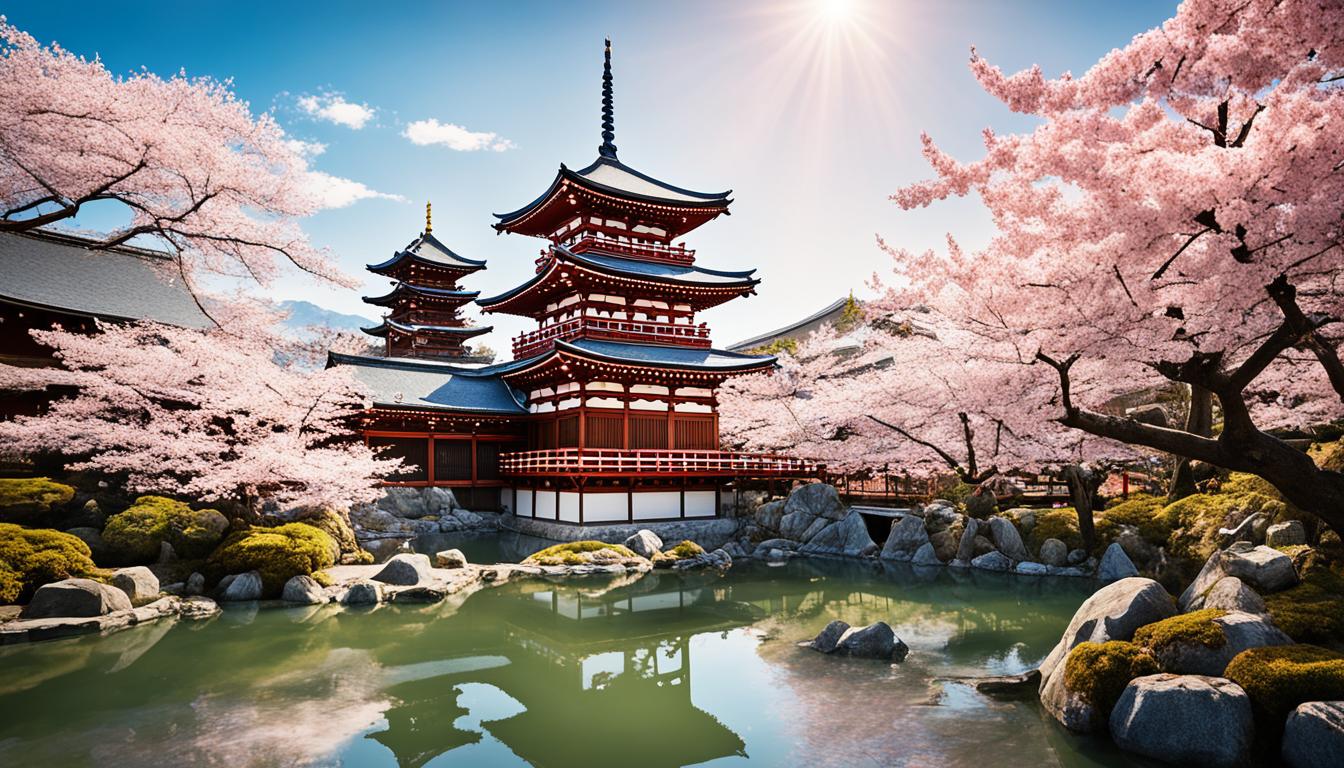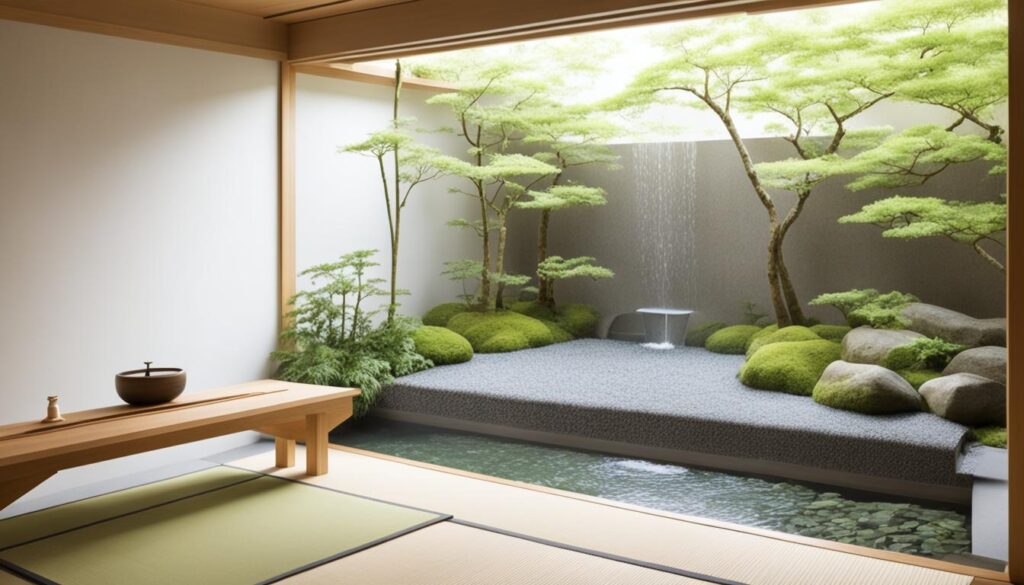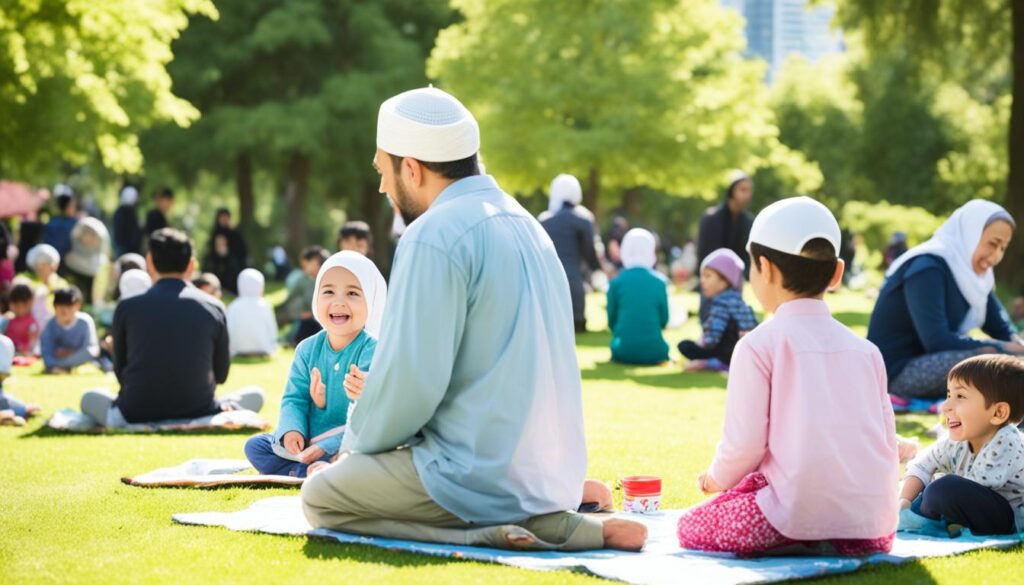
Discover Serenity: Mosques in Japan Revealed
Did you know that Japan, known for its breathtaking scenery and vibrant cultural heritage, is also home to several magnificent mosques? While the Muslim community in Japan may be a minority, their presence and devotion can be felt in the form of these awe-inspiring Islamic places of worship. From historical mosques steeped in centuries of history to modern prayer spaces designed to provide tranquility, Japan offers a unique opportunity for Muslims to explore and experience the rich tapestry of its Muslim-friendly offerings.
Join us as we embark on a journey to uncover the best mosques in Japan, delve into the captivating stories behind their establishment, and discover the exquisite beauty they hold. From Tokyo to Kyoto, we’ll take you on a tour of these sacred places, sharing the history, culture, and serenity that await those who seek solace within their hallowed walls.
Ramadan in Japan: A Unique Experience of Faith and Cultural Blend
Observing Ramadan while living in Japan can be a challenge, given the country’s status as a minority Muslim community. However, many Muslims in Japan find ways to celebrate and embrace Ramadan, even in a different cultural context.
Preparing for Ramadan in Japan involves finding halal food, exploring local businesses, and blending Japanese and Indonesian flavors. Fasting hours in Japan vary with the seasons, but the experience of iftar and suhoor is enriched by the backdrop of blooming cherry blossoms.
“Ramadan in Japan is a beautiful amalgamation of cultural diversity and faith. While it may present unique challenges, it also provides an opportunity for Muslims to deepen their connection with the local community and create lasting memories.”
During Ramadan, Muslims in Japan come together for iftar, the meal to break their fast after sunset. Muslim-friendly restaurants and local community organizations often organize iftar gatherings, providing a space for Muslims to connect and share the joy of Ramadan.
Suhoor, the pre-dawn meal before the day’s fasting begins, is an important part of Ramadan. In Japan, Muslims can enjoy a special suhoor menu that infuses Japanese and Indonesian flavors, creating a fusion of tastes that reflects the unique cultural blend of the country.
“Ramadan in Japan offers a beautiful fusion of culinary delights, bringing together the flavors of Japan and the traditions of Islam. It is a celebration of diversity and a testament to the richness of cultures.”
The spiritual aspect of Ramadan is also embraced in Japan. Muslims gather in prayer spaces, homes, and local mosques to perform tarawih prayers, a special nightly prayer during Ramadan. The recitation of the Quran and reflections on its teachings deepen the spiritual experience and foster a sense of unity within the Muslim community.
Despite the challenges and cultural differences, Ramadan in Japan offers a unique opportunity for Muslims to strengthen their faith, immerse themselves in a different cultural setting, and foster connections with both the Muslim and Japanese communities.
The Joy of Ramadan Reflections
Ramadan is not just about fasting; it is a time for self-reflection, gratitude, and self-improvement. Muslims in Japan engage in acts of kindness, charity, and self-discovery during this holy month.
- Reflecting on the blessings of Ramadan and expressing gratitude for the opportunities it brings
- Engaging in acts of charity and giving back to the community
- Deepening the understanding of Islamic teachings and striving for self-improvement
- Forging bonds with friends, family, and the wider Muslim community through shared iftar and suhoor experiences
These acts of reflection and self-improvement add a deeper dimension to Ramadan in Japan, creating a transformative and memorable experience for Muslims living in the country.
| Aspect of Ramadan in Japan | Experience |
|---|---|
| Fasting Hours | Vary with the seasons but offer unique moments of iftar and suhoor amidst cherry blossoms |
| Iftar Gatherings | Organized by Muslim-friendly restaurants and local community organizations, providing a space for Muslims to connect and share the joy of Ramadan |
| Suhoor Menu | A fusion of Japanese and Indonesian flavors that embodies the cultural blend of Japan |
| Tarawih Prayers | Gatherings in prayer spaces, homes, and local mosques to perform special nightly prayers and recite the Quran |
| Reflections and Self-Improvement | Acts of kindness, charity, and deepening the understanding of Islamic teachings during Ramadan |
Muslim-Friendly Culinary Delights: Finding Halal Food in Japan
Finding halal food in Japan has become easier in recent years, with an increasing number of Muslim-friendly restaurants and shops. Whether you’re craving traditional Japanese cuisine or a fusion of Japanese and Indonesian flavors, Japan has a diverse range of options to satisfy your taste buds.
In major cities like Tokyo, Osaka, Kyoto, and Fukuoka, you’ll find a plethora of halal restaurants serving a variety of cuisines, including Japanese, Turkish, Indian, Indonesian, and Malaysian. These establishments prioritize the sourcing and preparation of their food to ensure it complies with halal standards.
Thanks to online platforms and apps, finding halal restaurants in Japan is just a few clicks away. These platforms provide listings and reviews to help you make informed choices about where to dine. Additionally, websites like JNTO Muslim Travelers’ Guide and Halal Gourmet Japan offer valuable information on Muslim-friendly eateries and ingredients.
One of the unique aspects of Muslim-friendly food in Japan is the fusion of Japanese and Indonesian cuisine. These two culinary traditions blend harmoniously, resulting in mouthwatering dishes that cater to Muslims’ religious beliefs. From sushi rolls with halal-certified seafood to ramen infused with traditional Indonesian spices, the fusion of flavors is a delight for the senses.
With the emphasis on halal-certified edibles and ingredients, Muslims living in Japan can also embrace their creativity in the kitchen. They can experiment with a variety of locally sourced ingredients to recreate their favorite dishes, combining the best of both worlds.
Sample Menu:
| Japanese Dishes | Indonesian-Inspired Dishes |
|---|---|
|
|
Whether you choose to dine out or explore your culinary skills at home, Japan offers an array of Muslim-friendly food options that cater to your religious requirements. Enjoy the fusion of Japanese and Indonesian flavors, and savor the unique dining experiences that await you in this captivating country.
A Journey of Reflection: Prayer Spaces and Worship in Japan
A Journey of Reflection: Prayer Spaces and Worship in Japan
In addition to fasting and the five daily prayers, Muslims in Japan have access to prayer spaces and opportunities for worship. These prayer spaces, whether in mosques or designated areas, provide a tranquil environment for Muslims to connect with their faith and find solace.
Tarawih prayers, observed during the evenings of Ramadan, hold a special significance for Muslims. In Japan, where the distance to the nearest mosque can be a challenge, many Muslims perform Tarawih prayers alone. While this may initially appear isolating, it can be a deeply intimate and spiritual experience. In the solitude of prayer, individuals are able to immerse themselves in reflection, strengthen their connection with Allah, and rejuvenate their hearts.

“In prayer, I find a sense of tranquility and peace amidst the bustling streets of Japan. It’s a time to reset, connect with Allah, and reflect on His blessings,” says Yusuf, a Muslim resident in Tokyo.
The recitation and reflection on the Quran, known as Tadarus, further enriches the spiritual journey of Muslims in Japan. Tadarus allows individuals to delve into the timeless wisdom of the Quran, exploring its universal message and seeking guidance for their daily lives. This practice not only deepens one’s understanding of the Quran but also serves as a means of connecting with fellow Muslims in Japan.
“Tadarus is a beautiful opportunity for us to engage with the Quran, ponder its verses, and gain inspiration from the stories of the Prophets. It fosters a sense of unity within the Muslim community, as we collectively explore the depths of our faith,” shares Aisha, a Muslim student in Osaka.
The Muslim community in Japan, comprising individuals from diverse cultural backgrounds, creates a sense of belonging and unity. Shared iftar sessions during Ramadan and cultural exchanges with Japanese friends and colleagues enhance the camaraderie and understanding between different communities. These activities not only strengthen the bonds of friendship but also contribute to greater tolerance and acceptance.
Prayer Spaces in Japan
| City | Mosque | Facilities |
|---|---|---|
| Tokyo | Tokyo Camii | Prayer rooms, ablution facilities |
| Osaka | Ogawa Mosque | Prayer room, Islamic library |
| Kyoto | Kyoto Jama Mosque | Prayer hall, halal restaurant |
These prayer spaces and the vibrant Muslim community in Japan provide a haven for Muslims seeking spirituality and communal worship. Despite the geographical challenges, Muslims in Japan are able to nurture their faith, connect with Allah, and find support in like-minded individuals.
Embracing Cultural Diversity: Muslims in Japan
The Muslim community in Japan is a vibrant and inclusive one, welcoming Muslims from diverse backgrounds and traditions. Despite being a minority group, Muslims in Japan find a sense of belonging and a warm reception in this foreign land. The cultural exchange between the Muslim community and the local Japanese population fosters understanding, acceptance, and respect for religious diversity.
Shared iftar sessions and gatherings provide a unique platform for cultural exchange and learning. Through these events, Muslims have the opportunity to share their stories, experiences, and the significance of fasting in their faith. Japanese friends and coworkers often show genuine curiosity about fasting practices, ask questions, and engage in meaningful conversations. This interest and acceptance demonstrate the Japanese society’s openness to learning about different cultures and religions.
“The cultural exchange that happens during iftar sessions is truly fascinating. We get to share our traditions, tastes, and values with our Japanese friends. It’s a beautiful way to build bridges between our communities.” – Amina Ahmed, a member of the Muslim community in Japan
This mutual respect and curiosity contribute to the overall experience of Muslims in Japan. It creates an atmosphere of unity, where individuals from different backgrounds come together to celebrate and embrace cultural diversity.
Muslim Community Iftar Session
| Date | Location | Guests | Highlights |
|---|---|---|---|
| June 20, 2022 | Tokyo Mosque | 200 | Ambassadors, local government officials, and Japanese friends attended the event, fostering deeper connections and understanding. |
| July 1, 2022 | Osaka Islamic Center | 150 | The event featured a cultural showcase, with traditional dances and music performances by both Muslims and Japanese volunteers. |
| July 12, 2022 | Kobe Mosque | 100 | Japanese volunteers prepared a special iftar menu, combining local flavors with traditional Muslim dishes. |
These iftar sessions not only strengthen the bond within the Muslim community in Japan, but they also create opportunities for building friendships and promoting cultural understanding. Through conversations and shared experiences, the barriers that may exist between different cultures and religions are gradually broken down.
The Japanese acceptance of fasting and interest in religious practices demonstrates the country’s respect for religious diversity. Visitors and residents in Japan can find solace and support in the welcoming nature of the society.

Muslim-Friendly Facilities: Hotels and Ryokans in Japan
To cater to the needs of Muslim guests, many hotels and ryokans in Japan offer a range of Muslim-friendly facilities and services. These accommodations understand the importance of creating a comfortable and welcoming environment for Muslim travelers, providing amenities such as halal-certified food options, prayer facilities, and information about nearby mosques. They aim to ensure that Muslim guests can practice their faith while enjoying their stay in Japan.
Muslim-Friendly Hotel Services
In addition to comfortable accommodations, Muslim-friendly hotels in Japan go the extra mile to cater to the needs of their Muslim guests. Some of the services and amenities they provide include:
- Muslim-friendly food options: These hotels offer halal-certified meals or meals prepared with halal ingredients, ensuring that Muslim guests can enjoy a variety of delicious dishes without any concern.
- Prayer facilities: Many Muslim-friendly hotels provide designated prayer rooms or prayer mats for guests to perform their daily prayers in a quiet and tranquil environment.
- Qibla directions: To assist Muslim guests in determining the direction of the Kaaba in Mecca, these establishments often offer qibla directions in their rooms or public areas.
- Information about nearby mosques: Muslim-friendly hotels in Japan are knowledgeable about the locations of nearby mosques and can provide guests with information on prayer times and transportation options.
- Separate bathing areas: Some hotels offer separate bathing areas for men and women, ensuring privacy and comfort during bathing rituals.
- Private onsen baths: For guests seeking a traditional Japanese bathing experience, some hotels provide private onsen baths that can be reserved, allowing Muslim guests to enjoy the therapeutic benefits of hot springs in a private and secluded space.
Muslim-Friendly Ryokans
Ryokans, traditional Japanese inns, also embrace the concept of Muslim-friendly hospitality. While maintaining the cultural authenticity of the ryokan experience, these establishments accommodate the needs of Muslim guests through the following features:
- Muslim-friendly meals: Ryokans offer halal-certified or halal-friendly meals, creatively incorporating traditional Japanese cuisine with halal ingredients to create a delightful fusion of flavors.
- Private dining options: Some ryokans provide private dining rooms for Muslim guests, ensuring privacy during meals.
- Prayer facilities: To cater to the religious practices of Muslim guests, ryokans may offer prayer mats and designated prayer areas within their premises.
- Information about nearby mosques: Similar to Muslim-friendly hotels, ryokans can provide information about nearby mosques and prayer times.
For Muslim travelers seeking accommodations that are sensitive to their religious needs, Japan offers a range of Muslim-friendly hotels and ryokans. These establishments provide an environment where guests can comfortably practice their faith while immersing themselves in the unique cultural experience that Japan has to offer.
Exploring Muslim-Friendly Prefectures in Japan
Japan’s efforts to become more Muslim-friendly have led to the emergence of prefectures that cater to the needs of Muslim travelers. These Muslim-friendly prefectures provide a welcoming environment, ensuring Muslim travelers can enjoy their visit to Japan while adhering to their religious practices. Three prefectures that stand out in terms of their Muslim-friendly offerings are Shizuoka, Hokkaido, and Hyogo.
Shizuoka
Located in the Chubu region, Shizuoka offers a growing number of restaurants and cafés that serve Muslim-friendly cuisine. Travelers visiting Shizuoka can relish in a diverse array of halal options, from traditional Japanese dishes to international flavors. To further assist Muslim visitors, Shizuoka even has its own website dedicated to catering to the needs of Muslim travelers, providing information on halal-certified restaurants, prayer spaces, and other useful resources.
Hokkaido
With its stunning landscapes and vibrant festivals, Hokkaido has become a popular destination for tourists from around the world. Recognizing the needs of Muslim travelers, Hokkaido has seen a significant increase in Muslim-friendly restaurants and hotels. Muslim visitors can now find halal eateries serving a variety of cuisines, allowing them to indulge in the flavors of Hokkaido without compromising their dietary restrictions. Additionally, Muslim-friendly hotels in Hokkaido provide facilities such as prayer mats and qibla directions, ensuring a comfortable stay for Muslim travelers.
Hyogo
Located in the Kansai region, Hyogo boasts a vibrant Muslim-friendly dining scene, particularly in Kobe City. Kobe City is known for its halal-certified Kobe beef, an iconic Japanese delicacy. Muslim travelers can savor the renowned Kobe beef, ensuring they enjoy an authentic and memorable culinary experience. In addition to the dining options, Hyogo also provides prayer facilities and other Muslim-friendly amenities, making it an ideal destination for Muslim travelers exploring Japan’s cultural treasures.
Comparison Table:
| Prefecture | Key Features |
|---|---|
| Shizuoka |
– Growing number of restaurants and cafés serving Muslim-friendly cuisine – Dedicated website catering to the needs of Muslim travelers – Halal-certified dining options |
| Hokkaido |
– Increase in Muslim-friendly restaurants and hotels – Variety of halal cuisines – Muslim-friendly facilities in hotels |
| Hyogo |
– Vibrant Muslim-friendly dining scene in Kobe City – Halal-certified Kobe beef – Prayer facilities and Muslim-friendly amenities |
These Muslim-friendly prefectures in Japan, namely Shizuoka, Hokkaido, and Hyogo, offer Muslim travelers the assurance of finding halal food and facilities that cater to their religious needs. Whether it’s experiencing the rich cultural heritage of Shizuoka, exploring the stunning landscapes of Hokkaido, or indulging in the culinary delights of Hyogo, these prefectures ensure a memorable and inclusive travel experience for Muslims visiting Japan.
Conclusion
Japan offers a captivating journey for Muslims seeking to explore the country’s rich cultural heritage while practicing their faith. With its mosques, prayer spaces, and Muslim-friendly accommodations, Japan is committed to embracing religious diversity and providing a welcoming environment for Muslim travelers. The sense of unity within the Muslim community, coupled with the genuine acceptance and interest displayed by the Japanese people, contribute to an unforgettable experience.
By immersing themselves in the local culture and embracing the unique traditions of Japan, Muslims can experience serenity and spirituality in the beautiful mosques scattered across the country. Whether it’s taking part in Ramadan reflections, enjoying Muslim-friendly culinary delights, or finding solace in prayer spaces, Japan offers countless opportunities for Muslims to connect with their faith and explore the vibrant Muslim culture in Japan.
Exploring Japan’s Muslim-friendly side is a journey that goes beyond mere travel. It is a transformative experience that nurtures appreciation for the cultural diversity that Japan so generously offers. Through their interactions and encounters with Japanese locals, Muslims can build bridges of understanding and foster a sense of unity among communities of different faiths. Japan’s commitment to embracing religious diversity provides a unique platform for Muslims to forge memorable connections and promote harmony worldwide.
Source Links
- https://japantoday.com/category/features/lifestyle/my-experience-with-ramadan-in-japan
- https://blog.gaijinpot.com/my-experience-with-ramadan-in-japan/
- https://muslimguide.jnto.go.jp/eng/travel_tips/japans-muslim-friendly-tourism-what-travelers-need-to-know/

Leave a Reply